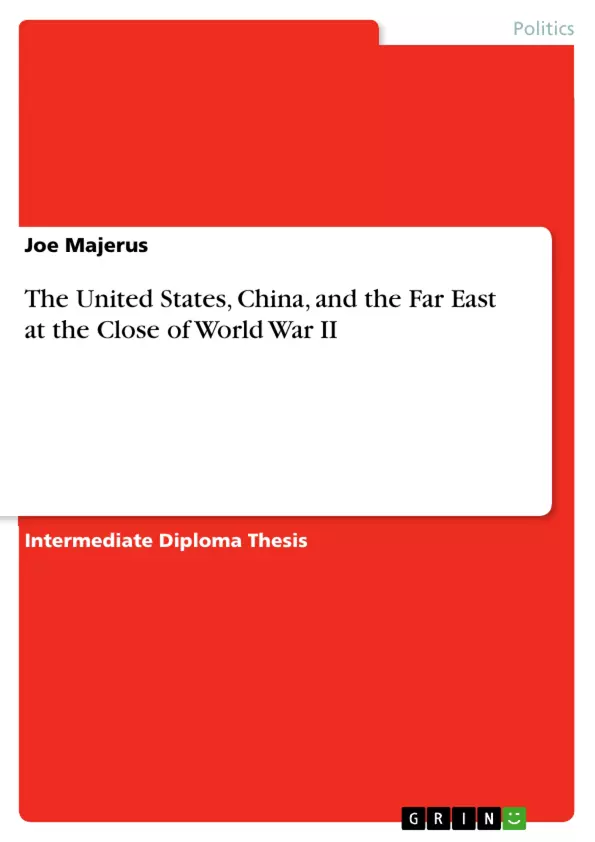Next to European reconstruction, political stability in Far East Asia was an equally important factor in the post-war thinking of American authorities at the time. Particularly the fate of China, a country not only occupied by the Japanese Army but also deeply riven by internal strife between nationalist and communist forces and thus dangerously teetering on the brink of civil war, was a matter of profound disquiet to senior officials in the Roosevelt and Truman Administrations. There existed several reasons for why China was given such a pre-eminent standing in American post-war designs. For one, as President Roosevelt had said in 1943, recent developments in world history had demonstrated that the personal freedoms of every American 'increasingly depend upon the freedom of his neighbours in other lands'. After all, a war which had started in seemingly remote areas such as Poland or China had soon spread to every continent, touching before long upon the lives and liberties of other peoples as well. Unless the peace which followed that war therefore recognized that the whole world was 'one neighbourhood and does justice to the whole human race', Roosevelt argued, 'the germs of another world war will remain as a constant threat to mankind'. Hence for Roosevelt, who regarded China as one of the great democracies in the world, it was self-explanatory that the United States had to render as much assistance as possible to shore up China, both during and after the war, all the more so since he counted China among the four nations with great military power which, if they stuck together in their common determination to keep the peace, would deny aggressor nations all possibility to start another world war.
Inhaltsverzeichnis (Table of Contents)
- The United States, China, and the Far East at the Close of World War II
- The Fate of China
- China as a Significant Strategic Front
- American Assistance to China
- The Antagonism Between Nationalist and Communist Forces
- Efforts to Pacify China
- The Yalta Meeting
- The Danger of a Segmented China
- Other Asian States
- The Desire for Independence from Colonial Rule
- The Need for Education for Self-Government
Zielsetzung und Themenschwerpunkte (Objectives and Key Themes)
This work analyzes the United States' post-war objectives and strategies for the Far East, with a particular focus on China. It explores how American authorities sought to navigate the complexities of Chinese politics, particularly the conflict between the Nationalist and Communist forces, in the context of broader geopolitical aims.
- The significance of a stable and united China in post-war world order.
- The challenges posed by internal strife and external influences in China.
- The complexities of American foreign policy in a multi-polar world.
- The role of the United States in shaping the future of Asia after World War II.
- The competing interests of major powers in the Far East.
Zusammenfassung der Kapitel (Chapter Summaries)
The text begins by examining the importance of a stable Far East Asia in the post-war thinking of American authorities. It highlights the particular concern for China, which was both occupied by Japan and deeply divided by internal strife. The text explores the various reasons why China held such prominence in American post-war designs, emphasizing President Roosevelt's belief in a 'one neighbourhood' world and his desire to ensure the freedom and security of all nations. The text also discusses the importance of providing aid to China to address food shortages and other necessities, recognizing that a secure peace could not be achieved without the restoration of normalcy and self-sufficiency in liberated countries.
The text then examines the complexities of American aid to China beyond purely military considerations. It emphasizes the US's recognition that internal stability and social cohesion were essential for China's role as a guardian of peace in the post-war era. However, the text highlights the increasing antagonism between the Nationalist and Communist forces in China, which threatened to destabilize the country and turn it into a major hotspot long after the end of the war.
The text further discusses American efforts to pacify China and reconcile the two competing factions, including Vice President Henry Wallace's mission to establish more harmonious relations between Chiang Kai-Shek and the Communists. The text explores the challenges faced by American officials in achieving this goal, including Chiang's reluctance to negotiate and the uncertainty surrounding Stalin's intentions in Far East Asia.
Schlüsselwörter (Keywords)
The text focuses on the United States' post-war policy towards China, exploring the complexities of its relationship with both the Nationalist and Communist factions. Key terms and concepts include: US foreign policy, Cold War, Far East, China, Chiang Kai-Shek, Chinese Communist Party, post-war reconstruction, multilateralism, and the impact of the Yalta agreements on the future of China.
Frequently Asked Questions
Why was China important to the US after World War II?
President Roosevelt saw China as one of the "four nations" essential for maintaining global peace and a key democratic ally in the Far East.
What was the internal situation in China in 1945?
China was deeply divided by a power struggle between Chiang Kai-Shek's Nationalists and the Communist forces, teetering on the brink of civil war.
What was the goal of the Wallace mission?
Vice President Henry Wallace was sent to China to encourage reconciliation between the Nationalists and Communists to ensure political stability.
How did the Yalta agreements affect China?
The Yalta meeting between major powers had significant implications for China's future sovereignty and the influence of the Soviet Union in the region.
What kind of assistance did the US provide to China?
Beyond military aid, the US provided humanitarian assistance to address food shortages and promote economic self-sufficiency in liberated areas.
- Arbeit zitieren
- Joe Majerus (Autor:in), 2018, The United States, China, and the Far East at the Close of World War II, München, GRIN Verlag, https://www.grin.com/document/1301736



